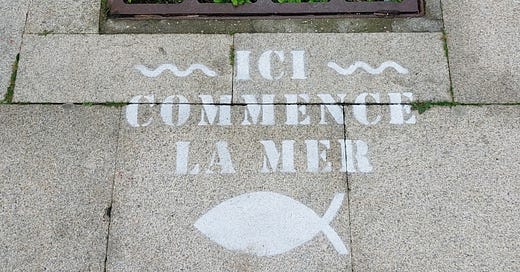Wetland round-up
- A slight change to this week’s bulletin; there’s the usual list of interesting wetland and water stories from the past week, but there’s an additional in-depth look at one story that hit the headlines in the Wetland Focus section. Of course, there’s still the usual look at wetland research and jobs! Let me know what you think about this style of Wetland News!
🧾 Wetlands in the news
'Wetland parks' plan to tackle flooding in Wales as weather becomes more extreme
Australian environment minister rejects harbour project over impact on globally significant wetlands
US imposes first-ever limits on levels of toxic PFAS in drinking water
Pythons are eating the Florida Everglades. Should we eat them instead?
£800K boost for Somerset’s wetlands will help revive nature’s splendour
Pioneering project to restore peatland on North York Moors has been completed
🔎 Wetland focus
Steve Backshall describes River Thames pollution as 'toxic'
To declare an interest: Steve Backshall is an honorary lecturer at Bangor University, where I’m based. Steve asked me if I could analyse some water samples from outside his home on the Thames, which I was delighted to do, as he’s such a cracking chap and gives so much time to our students. The next time he came up to give a lecture at Bangor he brought up five samples, which I then got my labs (Bangor Wetlands Group) and another lab in the university (Waste Water Research Centre Wales) to analyse. When I presented him the results he was completely shocked at the high levels of viruses, bacteria and nutrients in them. I’d like to say I was surprised, but I was more disappointed that yet again the quality of our rivers can reach such dire levels.
Steve is now using his considerable voice and clout to raise awareness of the issue. This is fantastic and it’s great to see him using my “death potion” quote to describe the pollution in the Thames, because as I point out in this BBC article, a sewage spill is a three-pronged attack on a river. In effect it’s a "trident of pollution" because you have 1) high levels of viruses and bacteria, 2) environmentally damaging levels of excess nutrients, and 3) the added unknown pollutants, such as pharmaceutical waste, PFAS (forever chemicals) and microplastics. All-in-all it’s not good news.
To tackle this unholy pollution trinity, we need something a little less glamorous than a trident, though maybe a little more practical. We need a trusty garden fork, with its four prongs:
The water industry must change (I make the clear distinction between water companies and industry here). The water industry has admitted it needs to do better and we must push them to do so. This needs to be done in an open, pragmatic and all-encompassing manner - with potential discomfort for both the industry and public. At the present time though, the water industry is not fit for purpose, it’s not what society wants and it’s not what the environment needs.
Water conscious construction industry. There is too much impermeable concrete. Buildings and developments must allow rainwater to soak naturally into the ground through so-called Sustainable Drainage Systems, or SuDS.
Harness the power of Nature-based Solutions. Our landscapes should be managed to naturally slow the flow of water entering rivers during heavy rainfall and, crucially, we need more wetlands. These superheroes of the natural world can filter and breakdown a huge range of different pollutants and we need to be restoring them and creating them in the UK on nothing short of a war footing.
Individual and societal rethink. We need to put a spotlight on other industries that are also responsible polluting our waterways and demand they improve. We also must accept a level of individual responsibility - littering and flushing certain items down the loo, all contribute to blockages and problems with our sewer system.
🧪 Wetland research
Economic Development Drives Massive Global Estuarine Loss
Human activities like land reclamation have drastically altered 44% of the world's estuaries in the past 35 years, with a quarter of a million acres lost to urbanisation or agriculture, particularly in rapidly developing nations with lax conservation regulations. This research underscores the urgent need for sustainable practices to preserve estuarine ecosystems while meeting economic development goals, especially in less affluent regions.
💰 Wetland jobs
Working Wetlands Administrator: Devon Wildlife Trust
The trust is looking for a team player comfortable working across a range of administrative, financial and team support tasks, to help with a wetland-based project.Principal Associate, Coastal Wetlands and Coral Reefs: Pew Charitable Trusts
The Principal Associate will help manage a large-scale seagrass mapping project in the Western Indian Ocean countries of Kenya, Tanzania, Mozambique, and Madagascar.
Get in-touch 📢
If you’d like to get in-touch please follow Dr Christian Dunn on Twitter/X (@christiandunn) or Instagram (@drchristiandunn), or email c.dunn@bangor.ac.uk.
If you have an image, news item, research item, or job you’d like to share in this newsletter, please get in-touch.




